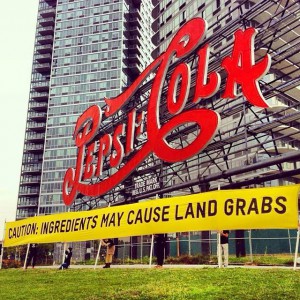 Today, food and beverage giant PepsiCo declared that it will no longer accept land grabbing in its global supply chains. Land grabbing occurs when Indigenous Peoples or local communities are kicked off their land so corporations can make profits from growing palm oil, sugar, and other crops.
Today, food and beverage giant PepsiCo declared that it will no longer accept land grabbing in its global supply chains. Land grabbing occurs when Indigenous Peoples or local communities are kicked off their land so corporations can make profits from growing palm oil, sugar, and other crops.
This announcement comes after significant consumer pressure from Oxfam’s Behind the Brand Campaign and PepsiCo investors who called on the company to adopt a zero-tolerance policy for land grabbing.
The adoption of its new Land Policy is a positive step forward for PepsiCo, but we know all too well that actions are stronger than words. PepsiCo must take real action to deal with its land grabbing problem. Given that land grabbing is also a symptom of PepsiCo’s deforestation and Conflict Palm Oil problems, it must now make the next bold move and implement a responsible palm oil sourcing and no deforestation policy.
PepsiCo is a huge company, operating in over 200 countries and earning $65.6 billion in revenue each year. Its well known brands, including Pepsi, Doritos, Ruffles, Cheetos and Quaker, are found in homes around the world. RAN has exposed the dangers of Conflict Palm Oil and the fact that it ends up in chips, cookies and granola bars made by PepsiCo. PepsiCo sources its palm oil from companies like Cargill, Wilmar and AAK in Indonesia, Malaysia and Mexico.
Despite the growing concern over Conflict Palm Oil, PepsiCo has not adopted a responsible palm oil policy to remove deforestation and social conflict from its global supply chain. Instead of taking responsibility for its supply chain, the company relies solely on the Roundtable on Sustainable Palm Oil (RSPO). The RSPO continues to certify companies that are destroying rainforests and peatlands and causing high greenhouse gas emissions. It also has a poor track record of enforcing its human and labor rights standards, and resolving disputes between certified companies and local communities over land grabbing.
PepsiCo cannot rely on the RSPO.
To address these problems fully, PepsiCo must join other leading consumer companies and adopt responsible palm oil sourcing and no deforestation policies and cut Conflict Palm Oil from its products.
You can help pressure PepsiCo to tackle its deforestation and Conflict Palm Oil problems next.
On May 7th, PepsiCo will need to face up to its shareholders who will be casting their vote on a deforestation resolution at its annual general meeting. With your help, we’ll convince PepsiCo to do the right thing for the forests and the people that depend on them for their survival. Add your voice here.
Banner photo via C.J. Chanco Inset photo via Oxfam